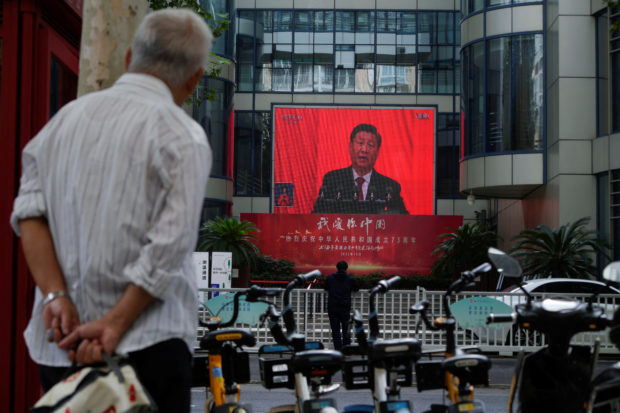Ten ways China has changed under Xi Jinping

FILE PHOTO: A man watches a screen showing the live broadcast of Chinese President Xi Jinping attending the opening ceremony of the 20th National Congress of the Communist Party of China, in Shanghai, China October 16, 2022. REUTERS/Aly Song/File Photo
BEIJING — Xi Jinping emerged from the 20th Communist Party Congress with a precedent-breaking third leadership term and a Politburo Standing Committee made up entirely of loyalists, cementing his place as China’s most powerful ruler since Mao Zedong.
Under Xi’s decade in power, China has undergone profound change, both domestically and within the global context.
Here are some of the ways that China has changed under Xi.
1. Perceptions of China in the West and U.S.-allied countries have worsened
U.S.-China relations have deteriorated sharply in recent years, a decline that accelerated under former U.S. President Donald Trump’s hawkish turn on Beijing. But western perceptions have also been worsened by concerns over human rights as well as China’s increasing aggession towards Taiwan.
2. Xi’s campaign against corruption
Upon taking office, Xi initiated a signature drive to root out corruption within the Communist Party, which has proven popular with the public and which numerous analysts say has also been a useful tool for eliminating political opponents.
3. The taming of once-unruly borderlands
The regions of Tibet, Xinjiang and Hong Kong, all far from Beijing, have long created headaches for China’s ruling Communist Party.
Xi launched unprecedented, sweeping security crackdowns that brought the borderlands under control.
In Xinjiang, that included the internment of an estimated one million minority Muslim Uyghurs in camps; in Hong Kong, Beijing responded to major anti-government protests in 2019 with a sweeping national security law.
Article continues after this advertisement4. Turning up the heat on Taiwan
All Chinese leaders since Mao have stressed the importance of “reunifying” China with the self-governed island of Taiwan.
But tensions across the Taiwan strait have sharply increased under Xi, with the People’s Liberation Army increasing its activity around the island in recent years, from military drills to a spike in incursions into the island’s air defense identification zone.
The August visit to Taipei by U.S. House Speaker Nancy Pelosi provoked Chinese military exercises on an unprecedented scale.
5. The state is increasingly taking the economic lead
Xi’s has ratcheted up state control and guidance of the economy, including a wide-ranging crackdown on the most free-wheeling sectors of the private sector, especially online platforms and for-profit education.
6. Slowing growth
Under Xi, the era of yearly double-digit growth has ended -inevitably, as the size of economy has grown. A growing number of analysts warn that China’s investment-heavy, infrastructure-driven model is increasingly unsustainable, with further slowdown ahead.
7. The quashing of dissent, the expansion of censorship
Xi has cracked down on domestic critics and protests, eliminating the space for dissent, while censorship inside China’s “Great Firewall” steadily intensifies.
8. The world’s largest military grows, modernizes
The People’s Liberation Army, led by Xi, has been closing the gap with the United States, including on the high seas, with major implications for tensions surrounding Taiwan, as China ratches up its capability to seize the island on what some U.S. officials warn is a shortening timeline.
9. China leads on green tech – and in pollution
While China struggles to shake its dependence on coal, it has become the global leader in the manufacture of electric vehicles and won plaudits for its pledge to achieve carbon neutrality by 2060. Most visibly, air quality in China has steadily improved over the past decade.
10. Extreme poverty eliminated, inequality persists
Xi describes elimination of extreme poverty in China as one of the key achievements the Party has achieved in the past decade.
Inequality, however, has proven a tougher challenge – especially the gap between urban and rural incomes – and it remains to be seen whether Xi’s “common prosperity” policy can prevent a future rise in inequality, as China faces growing economic headwinds.